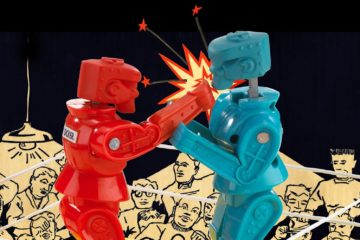This is a strange time. Rarely in life do you see a country-wide reaction such as this. March Madness? Canceled. NBA? Indefinitely postponed. Ditto for all other professional sports. The Olympics have even been postponed until next year. School’s out for the foreseeable future, most businesses (that can) are having their employees work from their couch, and many cities have mandated that only essential businesses can be open. And on top of it all – churches aren’t meeting either.
This virus has caused massive changes for most of us, in every area of life. Work, school, church, social life, hobbies – things have changed, if only for a time. Times like these often lead to fear. They lead to worry, to stress, to anxiety.
These can be demonstrated in many ways:
– Fear that I, or a loved one, may catch the virus.
– Anxiety that essential, daily-life supplies are dwindling and there aren’t any in stock at my local store.
– Worry that our country’s anxiety seems to be mounting every day.
– Fear that the virus’ long-term effect on the economy is going to significantly hurt me and my family financially.
– Stress because normal, habitual parts of our lives are canceled or postponed.
Here’s what we need to understand – fear, anxiety, and worry come upon us when we realize that we’re not in control of the outcome. And what we seldom realize is that the control we think we’ve lost due to this pandemic, we never really had in the first place.
I read through a passage in the book of Genesis the other day that made me think of our current situation. God called Abraham to go from his homeland, to a land the Lord would show him. God promised to show Abraham this land, and to make him into a great nation. Genesis 12:4 tells us how Abraham responded, “So Abram went, as the Lord had told him…” Notice how that transpired – the verse tells us what Abraham did, and the reason behind why he did it.
A few verses later, Gen. 12:10 tells us that a famine has come over the land. It was a severe famine and food was scarce. You can imagine the questions running through Abraham’s mind. How are we to eat? I’ve got my wife with me. Other people have set out on this journey with us. How are they to eat? How am I to become a great nation in the land God has promised if we starve on the journey along the way?
Understand this – At this moment, the famine looks big in Abraham’s eyes, and God looks small.
Now we see a verse similar to Abraham’s act of obedience earlier. Except this time Abraham acts, not out of obedience, but out of fear. Gen. 12:10 says, “So Abram went down to Egypt to sojourn there, for the famine was severe in the land.” Again we have Abraham’s action, followed by the reason behind why he did it. The fear of the famine is weighing on him, so Abraham alters his travel arrangements and heads into Egypt. Once there, he runs into all sorts of issues with Pharaoh, and is eventually kicked out of Egypt.
Abraham went from obedience to the call of God, to taking his cues from his fear. Fear became the driving force behind his actions.
It’s too easy for us to do the same. We can be anxious because there’s something we need, and we’re afraid we will not get it – i.e. food, toilet paper, proper medical care, etc. Or we can become anxious because there’s something we have, and we’re afraid we may lose it – i.e. savings, retirement money, our job, our business, etc.
You see, times like these often expose our idols. Times like these can show us that we’re trusting God with some things, but yet we still keep some things under our control. And, when we realize that we really aren’t in control, a sense of panic and trepidation comes over us. Times like these point out that, while we may be entrusting God with our eternal security, we still want to take our earthly security into our own hands.
We want something to look to – our bank account, our regular paycheck, our steady job, our good health, our 401(k), our well-stocked pantry – in order to feel secure. And when these are threatened, our tendency is to do exactly what Abraham did – make moves out of fear. When these are threatened, the famine – or the coronavirus and its effects – looks big, and God looks small.
Why is it we want to look to these things for our security? Pastor Tim Keller has an answer, “We cling to these other things because we all believe, at the deepest level, that if we clung completely to God, he’d let us down.”
This isn’t new to us. Abraham dealt with it. He detoured into Egypt. The Israelites dealt with it on their way to the Promised Land. God was providing daily manna from heaven, and yet they still wanted to stockpile it for a rainy day. This isn’t new. We ride the fence between trusting God and living in fear because of what we cannot control. We look to other things for security, all the while completely unaware that the things we look to are simply a mirage.
So how are we to respond in times like these? We’re to respond like David, who wrote in Psalm 56:3, “When I am afraid, I put my trust in you.” The Lord wants us to replace daily fear with daily trust. That’s not to say we shouldn’t act in wisdom. There’s a reason we’re not physically meeting together as a church at this time. By all means, we need to be wise. We need to make preparations. We need to make thoughtful financial decisions. But we do this, not from a sense of panic and fear, but with the steady assurance that the Lord is still in control.
Jesus himself said in Matt. 10:29-31, “Are not two sparrows sold for a penny? And not one of them will fall to the ground apart from your Father. But even the hairs of your head are all numbered. Fear not, therefore; you are of more value than many sparrows.”
The Lord cares for us. And he promises us that he will be with us. He doesn’t promise us an easy road in the midst of difficulty. He doesn’t promise that you, or a loved one, won’t catch the virus. He doesn’t promise a quick recovery if you do, regardless of what any televangelist says. He doesn’t even promise us tomorrow. But what he does promise is his presence alongside us in the center of it all.
So let’s keep six feet between ourselves and others, our hands washed, and our eyes on the Lord. In him we place our trust. Let’s also not get so focused on ourselves and our own current situation that we forget the troubles our neighbors are going through as well. We are to love our neighbor, even (and perhaps especially) when it’s incredibly inconvenient. Some ideas – Ask to run errands for the elderly, who may be shut in and do not want to get out to go to the store. Offer to babysit the out-of-school kids of someone who is trying to work during the day. Volunteer to give blood, as there is currently a shortage. And always be thankful and encouraging of grocery store employees when you’re in their stores.
We are the hands and feet of Christ. In times like these, let’s be diligent, trust in the Lord, and lead the way when it comes to courage, wisdom, a calm demeanor, an optimistic outlook, and good deeds.


